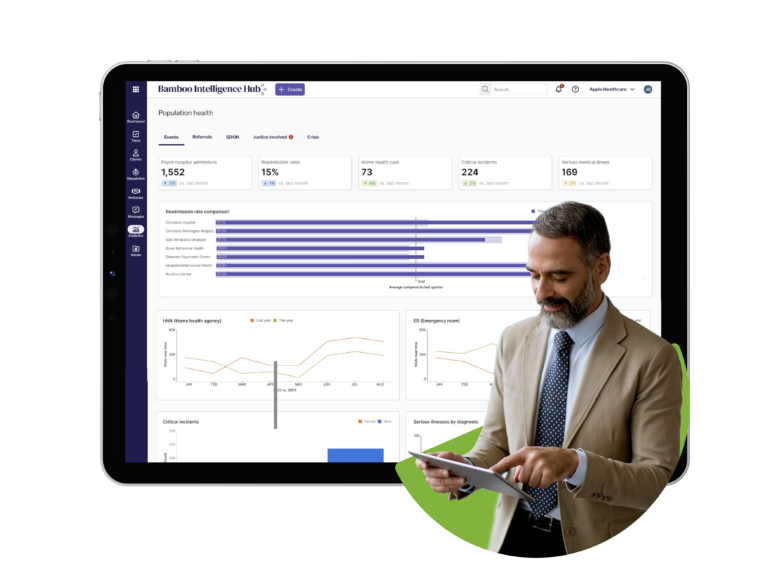The Challenge
Many BAYADA clients are on Medicare while others hold private insurance, and a large percentage have mild, yet chronic conditions while others have acute conditions. Because of this, managing their populations was challenging. Clients were admitted to emergency departments (EDs) for an array of challenges, and BAYADA didn’t have real-time visibility into when and why those admissions occurred. Furthermore, upon discharge from the hospital or ED, patients weren’t always referred back to affiliated organizations, affecting the patient’s continuity of care.
BAYADA’s staff had no easy way of tracking individuals’ care journeys, making the efficient delivery of care and operations very challenging. At times, there would be a delay in hospital discharge, and the nurse would be deployed for follow-up care to find an empty home. At other times, nurses would be deployed to a client’s home for regular routine care, only to find out that the client wasn’t there because they had gone to the hospital for care. This would often become a costly, time-consuming process of manually calling other facilities to assess the situation and attempt to bring the patient back into follow-up care as needed.
Moreover, the nationwide expansion of the Home Health Value Based Purchasing (HHVBP) program only exacerbated these challenges and further highlights the need for real-time data and actionable insights for proper intervention. HHVBP relies on data coming from claims, Outcome and Assessment Information Set (OASIS), and Health Care Consumer Assessment of Healthcare Providers and Systems (HHCAHP) survey results. The complicated nature of balancing the highest quality of care, capping the overall spend and ensuring patients are receiving the appropriate care in a timely manner further adds to caregivers’ and care coordinators’ plates and makes HHVBP success that much more of a challenge.

The Solution
Enter Bamboo Health’s Pings™, which deliver real-time notifications whenever patients experience care events, whether they are at a hospital, ED or post-acute facility. First, BAYADA ran a pilot to test Pings in two offices in central North Carolina (towns of Guilford and Davidson), as a means of demonstrating value and return on investment of Pings across the company’s locations. There was an additional pilot in select parts of Florida, where BAYADA’s challenge was magnified.
In order to support those in the HHVBP program, Bamboo Health’s Pings solution enables continued patient engagement and care coordination when patients are discharged from home health services. The majority of HHVBP performance measures are linked to reducing unnecessary readmissions and ED presentations, so one of the most impactful ways home health agencies can increase HHVBP performance is through improving post-discharge care coordination and engagement.
For example, if an individual presents at the ED, a BAYADA Clinical Manager is aware via a real-time notification that provides the where, when and why. The ‘Ping’ also highlights if the patient is a multi-visit patient, which helps the Clinical Managers identify if different care is needed to reduce the likelihood of an unneeded admission, which in turn helps improve HHVBP Total Performance Score (TPS). After receiving a Ping, the clinical manager can communicate with the ED physician, helping to make the proper care decision, as well as reach out to the patient or their family directly to help ease concerns or educate them about BAYADA’s in-home service offerings.
As an added benefit, home health agencies can strengthen referral relationships with their health system partners by providing visibility into patient care transitions received from Pings. This not only improves continuity of care, but factors into better HHCAHP survey results, ultimately leading to a higher total performance score, too.
If a hospital admission is necessary for the patient, Pings also alerts BAYADA’s Clinical Managers of that admission, as well as any transfers and discharges so that in-home, follow-up appointments can be scheduled promptly. Receiving Pings provides new levels of informed awareness, proactive communication and results—all of which enable better quality performance under HHVBP.
The Results
Over a 90-day period in the North Carolina pilot, the Guilford office received 1,643 Pings and the Davidson office received 859 Pings. These real-time notifications allow BAYADA’s Clinical Managers to follow the paths of their clients in real time, which enhances care quality and eliminates unnecessary costs. Pings also helps the staff retain significant revenue for the business.
In North Carolina, an area that comprises roughly 1,800 clients on service, 200 employees and up to 500 admissions per week, BAYADA realized the following results:
patients recaptured over an 83-day period
in revenue saved over an 83-day period
decrease in missed care opportunities at Guilford over a 90-day period
decrease in missed care opportunities at Davidson over a 90-day period
Due to such success, BAYADA expanded the use of Pings to all of North Carolina, South Carolina and Pinellas County in Florida. In the first three quarters of 2022, BAYADA’s ‘Pinging’ locations in North Carolina, South Carolina and Florida received over 18,000 Pings from Emergency Departments. This translates to 46% of the total Pings volume received were due to their patients going to the ED, thus providing a key opportunity for effective care coordination and follow-up care.

The implementation of Pings was a breeze, so our pilot was up and running quickly without any hiccups.
Jeanne Barton BAYADA Division Director, Eastern North Carolina and Florida
Immediately, receiving real-time alerts about our clients was like a breath of fresh air. To me, one of the worst downfalls to have as a home health agency is when we don’t get notified that a client has been discharged from the hospital, and that client is then home for days without anyone from BAYADA seeing them. That problem is eliminated by Pings and I can’t tell you how relieved we were to finally be able to follow their journey through the care continuum, understand what’s happening, and act. Having Pings has made us more efficient and effective in delivering care than ever before.
About BAYADA
In 1975, the ambitious and passionate Mark Baiada founded BAYADA Home Health Care based on a simple belief that everyone deserves a safe home life with comfort, independence and dignity. Since then, BAYADA has become one of the nation’s most trusted leaders in clinical care and support services at home, for both children and adults of all ages.
By hiring compassionate home health care professionals who share that same belief, BAYADA now provides a comprehensive array of home care services to more than 145,000 clients a year in 24 states and 7 international countries and growing. The foundation of its success is rooted in The BAYADA Way—the company’s guidepost that expresses its mission, vision, beliefs, and core values of compassion, excellence and reliability.
About Bamboo Health
Bamboo Health empowers healthcare organizations to improve behavioral and physical health outcomes through the most powerful care collaboration network with Real-Time Care Intelligence™. By providing real-time insights during pivotal care moments, clients are enabled to perform life-improving actions and deliver seamless, high-quality and cost-effective whole-person healthcare. From coast to coast, Bamboo Health partners with five of the six major pharmacy chains, 52 states and territories, 100% of the top 10 best hospitals and more than half of the country’s largest health plans to improve more than 1 billion patient encounters annually.



